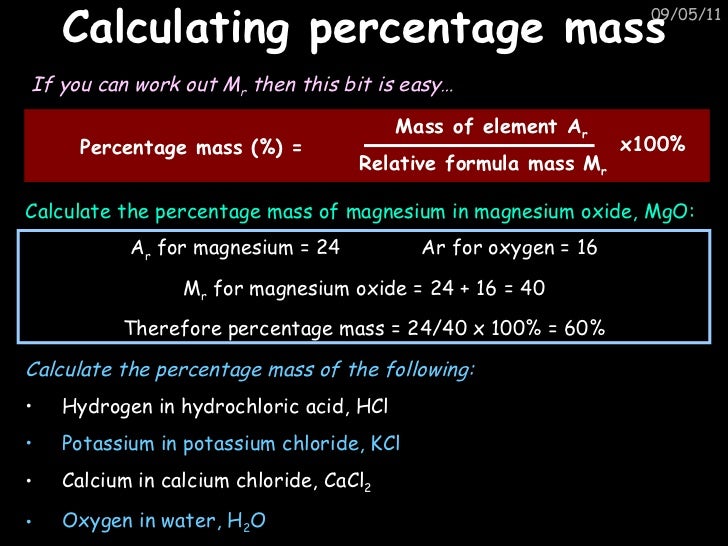If you’re wondering how to calculate percentage by mass GCSE, you’re not alone. Many students struggle with this concept, which is why we’ve put together this guide to help you out. Whether you’re trying to prepare for an exam or simply trying to better understand chemistry, this guide has everything you need to know to master percentage mass calculations.
Calculating percentage mass can be a daunting task. It requires a deep understanding of chemistry concepts and math skills. Many students struggle with the process and may feel overwhelmed by the complexity of the calculations. Additionally, figuring out which formulas to use and how to apply them can cause frustration for many students.
The first step in calculating percentage mass is to understand the basic formula. Percentage mass is calculated by taking the mass of the solute and dividing it by the total mass of the solution. This number is then multiplied by 100 to get a percentage. For example, if you have a solution that is 10% sodium chloride, the percentage mass would be calculated by dividing the mass of sodium chloride by the total mass of the solution.
In summary, calculating percentage by mass GCSE involves taking the mass of the solute and dividing it by the total mass of the solution, then multiplying by 100. It’s important to carefully follow the steps in the formula and double-check your calculations to ensure accuracy.
Understanding the Target of Percentage by Mass GCSE
Percentage by mass GCSE is a commonly tested concept in chemistry exams. It is essential to have a firm understanding of this topic to perform well on the exam. Understanding this concept will also help you better understand other chemistry concepts and how they relate to each other. For example, if you understand the concept of percentage by mass, you’ll be better equipped to understand how to prepare solutions and balance chemical equations.
When I was in high school, I struggled with understanding percentage by mass. However, with the help of my chemistry teacher and extra practice, I was able to master this topic. Once I understood the formula and the steps involved, I was able to solve any problem related to percentage by mass.
Breaking Down the Formula for Percentage by Mass GCSE
To calculate percentage by mass GCSE, you’ll need to know the mass of the solute and the mass of the total solution. Once you have these values, you can plug them into the following formula:

To better understand this formula, let’s look at a quick example. Imagine you have a solution that contains 5 grams of sugar and 20 grams of water. To find the percentage by mass of sugar in this solution, you would plug in the numbers as follows:
Percentage by mass of sugar = (5 g / 25 g) x 100
Percentage by mass of sugar = 20%
Cautions While Calculating Percentage by Mass GCSE
It’s important to note that this formula will only work if you’re dealing with a solution. If you’re working with a pure substance, you’ll need to use a different formula. Additionally, it’s important to ensure that you’re using accurate measurements when calculating the mass of the solute and the total mass of the solution. Any errors in measurement can lead to inaccurate results.
Practice Makes Perfect
The best way to master percentage by mass GCSE is through practice. The more you practice, the more comfortable you’ll become with the formula and the process. Try solving a variety of problems related to percentage by mass to improve your skills. You can find practice problems online or in textbooks, or ask your teacher for additional resources.
Question and Answer Section
What is the difference between percentage by mass and percentage by volume?
Percentage by mass refers to the percentage of a solute in a solution by weight. Percentage by volume, on the other hand, refers to the percentage of a solute in a solution by volume.
What is the formula for calculating percentage by mass GCSE?
The formula for calculating percentage by mass GCSE is (mass of solute / mass of total solution) x 100.
Why is understanding percentage by mass important in chemistry?
Percentage by mass is an essential concept in chemistry because it helps us understand the composition of a solution. This knowledge is crucial when preparing solutions, balancing chemical equations, and conducting experiments.
How can I practice calculating percentage by mass GCSE?
There are many resources available online that provide practice problems related to percentage by mass GCSE. You can also ask your teacher for additional resources or create your practice problems based on the material covered in class.
Conclusion of How to Calculate Percentage by Mass GCSE
Calculating percentage by mass GCSE may seem daunting at first, but with practice and a solid understanding of the formula and process, you can master this concept. It is an essential topic in chemistry and is frequently tested on exams, so it’s crucial to have a firm grasp of the material. By following the steps outlined in this guide and practicing regularly, you’ll be well on your way to acing your chemistry exams and improving your understanding of this fascinating subject.
Gallery
How To Find Percentage Mass – Complete Howto Wikies

Photo Credit by: bing.com / percent calculate calculator massa percentuale
4 Ways To Do Percentages On A Calculator – WikiHow

Photo Credit by: bing.com / calculator percentages percent calculate goodwill
Gcse C5 Reacting Masses Revision

Photo Credit by: bing.com / masses reacting aqa mass calculating theresa
How To Calculate Mass Percent.

Photo Credit by: bing.com / mass naoh therefore
How To Calculate Mass Percent Of A Solution Given Density

Photo Credit by: bing.com / calculate percentage massa compound cfu calcolare percentuale molecular residual molare